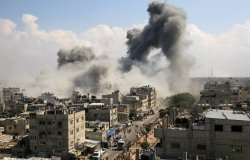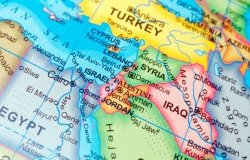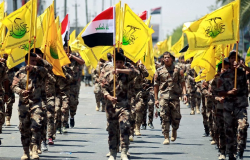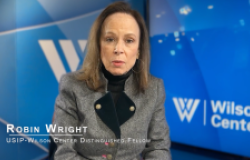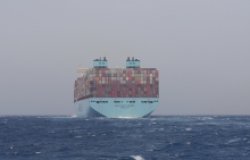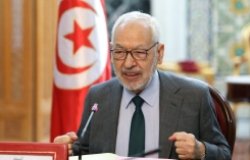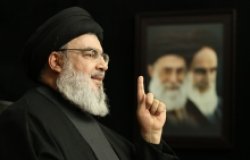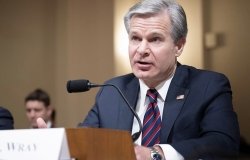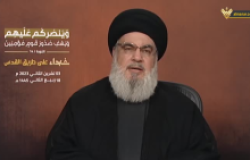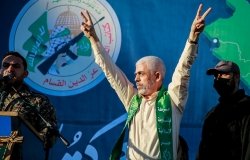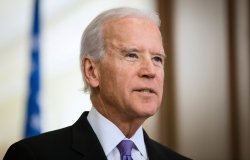Iraqi Parliamentary Speaker: ISIS Result of Exclusion, Repression
On June 8, the speaker of Iraq’s parliament Dr. Saleem al Jubouri traced the origins of ISIS – also known as Daesh, ISIL, or the Islamic State – to the “policy of exclusion and repression of freedoms during the past.”
On June 8, the speaker of Iraq’s parliament Dr. Saleem al Jubouri traced the origins of ISIS – also known as Daesh, ISIL, or the Islamic State – to the “policy of exclusion and repression of freedoms during the past.” At an event hosted by the U.S. Institute of Peace, Jubouri also emphasized the need to promote stability in areas liberated from ISIS control, serving as motivation for Iraqis still living in ISIS territory. Jubouri stressed that ISIS cannot be effectively countered without providing arms and resources to local populations, though these efforts need to be coordinated through the central government.
The following are excerpts from Dr. Jubouri’s remarks.
“I am speaking to you a year after the appearance of Daesh’s occupation of one third of the country, and the accompanying destruction, murder, and killing in the governorates that were attacked. There have been attacks on women, the destruction of churches, antiquities, and holy shrines. Some of these antiquities date back thousands of years. Despite all of our pain in terms of the destruction that has been inflicted on our people, we were not surprised about this movement, because I know that it is a result of the policy of exclusion and repression of freedoms during the past, and a natural result of the administrative and financial corruption which spread to the military and other institutions of the state. We spoke with our allies outside and our friends about the catastrophic results to which these policies will lead us, but regrettably they did not take our advice seriously. We were dealt with as if this were part of the struggle between various parties.”
“We have all witnessed how Iraq has been transformed into a country of displaced. Iraq has produced about 3 million displaced people in the areas that are controlled by Daesh… Instead of containing them, and redirecting their ideas, we prevented them from reaching the shore of safety. As a result, we have created a large army of recruited people who are being targeted by Daesh. The future of the displaced has been wasted.”
“Despite this situation that is so dark, yet I will talk to you about peace in Iraq. Peace that can be achieved in this war that is led by the children of my country in the face of this dark movement in history.”
“We must think about stability in the areas liberated from Daesh, and to give a model to motivate those still living under Daesh to face this challenge.”
“Extremism and terrorism are very strange things in Iraqi society. They originated from political circumstances that were complicated, and they will end with the end of this problem. Therefore, eliminating Daesh will help our ability to establish peace.”
“I call on the international community to focus on a project of stability after the liberation of areas from Daesh. This project of stability is not assistance in kind, food and other aid, but it is to achieve stability and to build a new democracy. It is to work on the minds of people, and try to spread the spirit of participation and reconciliation. And this is not a human project – it is a human project, but it is also a security project, so it is important that Daesh does not come to us under a new name. How can it come if we achieve justice and stability? It will return if there is marginalization and exclusion, and if there is a feeling that people are not allowed to participate. So the message we must send to the two and a half million people under the rule of Daesh - some of them are afraid, some of them don’t have any financial power, and some are women and children - the most important message to send to them is that the models we established after the liberation of Daesh are now in much better condition. But if these models are bad, they will not think of venturing with their life against Daesh. Why would they defeat Daesh? We should have a project for establishing stability that takes into account the continuity of democracy.”
“I am a Sunni myself, and I’m proud of that. But I have nothing to do with Daesh, and Daesh does not represent the Sunnis, Shiites, Kurds, or any component of Iraqi society. It has a project limited to killing and bloodshed, and this is not Iraqi. But how can we deal with the Sunnis to encourage them to confront Daesh? When the people of Anbar fought against al Qaeda in 2005, and were able to defeat it, many of those carrying weapons were tried and detained. Now many of them need guarantees – if they confront Daesh, who is going to protect them from the state afterwards? Who is going to protect them from the law, if there is no mechanism in this respect? Therefore, they are looking for someone who can stand by them, and the party they need most is the prime minister, to interact with them, and he is responding to their desires. There are economic problems, and problems related to weapons, but the fact of the matter is, in my own conviction, that the arming of the tribes is not good, is not complete. And the question is, can we equip them directly?”
“We must arm the tribes. We cannot eliminate Daesh without the local population, through coordination with the federal government, to have guarantees so these weapons will reach the local population to confront Daesh.”
“Some oil wells are under control of Daesh, and they are engaged in commerce. Daesh is investing these areas economically, and is benefiting from the weapons left by the Iraqi army during the battles, and so we have to go on the road of joint interests, and not struggle. What is the value of land if its inhabitants are not protected?”
“We have two options militarily to confront Daesh. The first is to rely on the official military forces only, and to strengthen, build, and restructure it, and to not give anyone else the ability to carry weapons. This is the preferred option. I think it is idealistic and it is consistent with the idea of the state and its stability. But the problem is that we are in exceptional circumstances, and the army is not at the level required. Official forces do not have the efficiency. So we resorted to something other than the army. If we arm Shiite groups and Sunni tribes, the fear is that we eliminate Daesh and there will be a struggle in the future. We must contain the official framework within a unified command. But the multiplicity of command and the victory of those who are armed will create a society that is in dispute with itself. If you want to take the second approach, there are dangers but we must be cautious about establishing a system through which we can distribute weapons and collect them in the end.”
The following is the full video of the event.
Click here for more coverage of Jubouri's visit
Related Program

The Islamists
Learn more about Hamas and how it relates to similarly aligned organizations throughout the region. Read more
